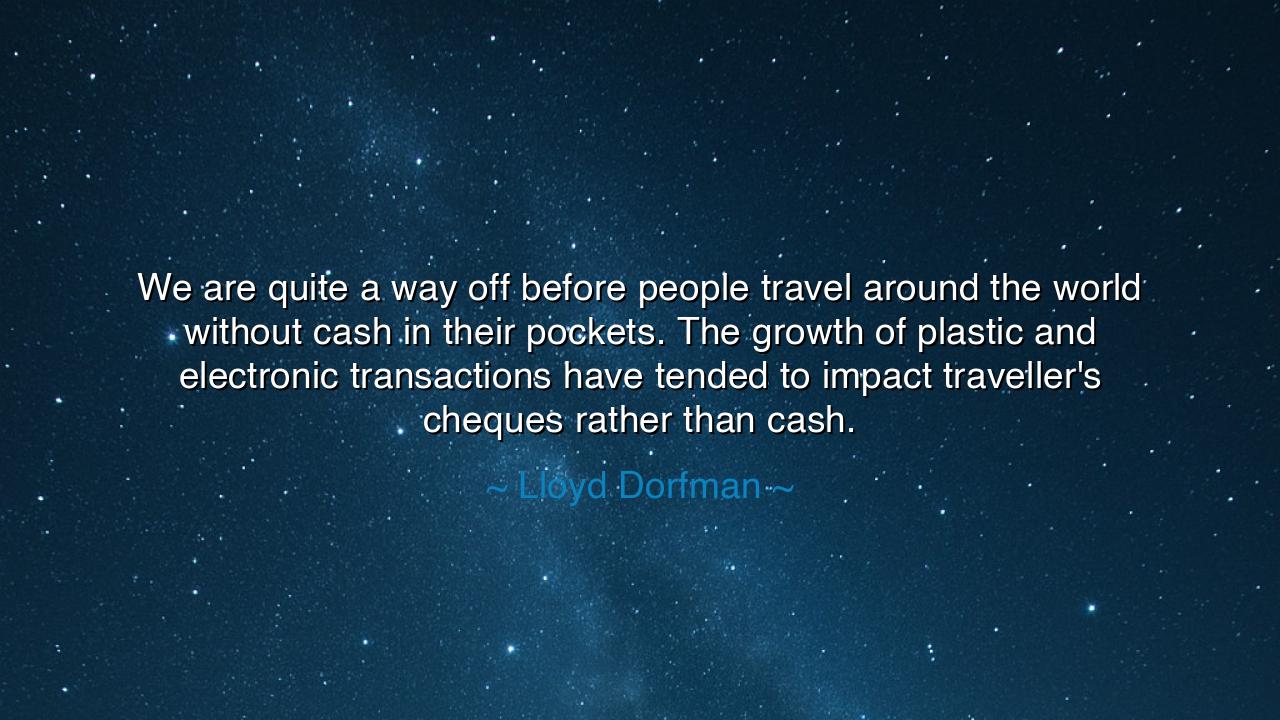
We are quite a way off before people travel around the world
We are quite a way off before people travel around the world without cash in their pockets. The growth of plastic and electronic transactions have tended to impact traveller's cheques rather than cash.






Hear the practical yet profound words of Lloyd Dorfman, founder of Travelex, who declared: “We are quite a way off before people travel around the world without cash in their pockets. The growth of plastic and electronic transactions have tended to impact traveller’s cheques rather than cash.” Though spoken in the language of business, these words echo with ancient wisdom: the tension between what endures and what changes, between the old instruments of trust and the new promises of progress.
To say that we are still far from a world without cash is to remind us that some things cling to life despite the rush of innovation. For centuries, coins and notes have been the physical embodiment of trust between people and nations. They are tangible, felt in the hand, exchanged in markets and temples alike. Dorfman, a man of commerce, recognized that while plastic cards and electronic payments rise swiftly, the primal reassurance of holding money endures, especially when one journeys far from home.
The mention of traveller’s cheques reveals the evolution of trust across ages. Once they were the noble invention of the 19th century, a safeguard for pilgrims, explorers, and merchants against the perils of theft or loss. With them, one could walk into foreign lands and still be anchored to the security of wealth left behind. Yet as time moved forward, these instruments waned, supplanted not by the end of cash, but by the rise of new forms of credit and electronic exchange. In this, Dorfman speaks to a truth: old systems rarely vanish at once—they are eroded gradually, reshaped by what people find more convenient.
History bears witness to this cycle. Consider the days of the Roman denarius, stamped with the emperor’s face, carried by legions across Europe, Africa, and Asia. It was more than metal; it was an emblem of Rome’s reach, a token of identity and power. When the empire fell, the denarius faded, but money itself did not perish—it simply transformed into the currencies of new kingdoms. So too today, as cash gives way to cards and digital transfers, its essence remains: the eternal human need to exchange, to trust, to transact.
The emotional force of Dorfman’s words lies in their realism. Many dream of a future where technology sweeps away the old, where the click of a button replaces every exchange. Yet he reminds us that in the dust of bazaars, in the narrow streets of distant lands, in the hearts of those who hold little but coins, cash remains king. It is not merely a relic; it is a bridge between worlds, a reassurance in places where the invisible lines of digital trust have yet to be drawn.
The lesson is clear: innovation must walk hand in hand with tradition. To leap entirely into the future without respect for what still sustains the present is folly. Just as traveller’s cheques gave way slowly to credit cards, so too will cash fade only when all hearts and all lands are ready to trust the unseen systems of the digital. Until then, wise travelers carry both—the old and the new—as a shield against uncertainty.
Practical wisdom follows: as you journey, do not rely solely on the glitter of new technology. Carry a measure of cash to honor the realities of the world you enter. Respect the systems that still hold sway among peoples, whether ancient coins or new devices. And in your life beyond money, remember this truth: progress does not erase the old in an instant; it transforms slowly, weaving past and future into the fabric of the present.
So let Lloyd Dorfman’s words endure: “We are quite a way off before people travel without cash… the rise of plastic has struck at traveller’s cheques, not yet at money itself.” This is not merely a lesson about commerce, but about all of life: that change comes in waves, not in floods, and that wisdom lies in walking with both feet—one rooted in what has been proven, the other stepping toward what is to come.






AAdministratorAdministrator
Welcome, honored guests. Please leave a comment, we will respond soon